Can I Water My Plants with Milk? A Friendly Guide
Ever wonder if you can use milk to water your plants? It might sound strange, but using milk can actually benefit your garden. Milk contains nutrients like calcium and proteins that can help your plants grow stronger and healthier.
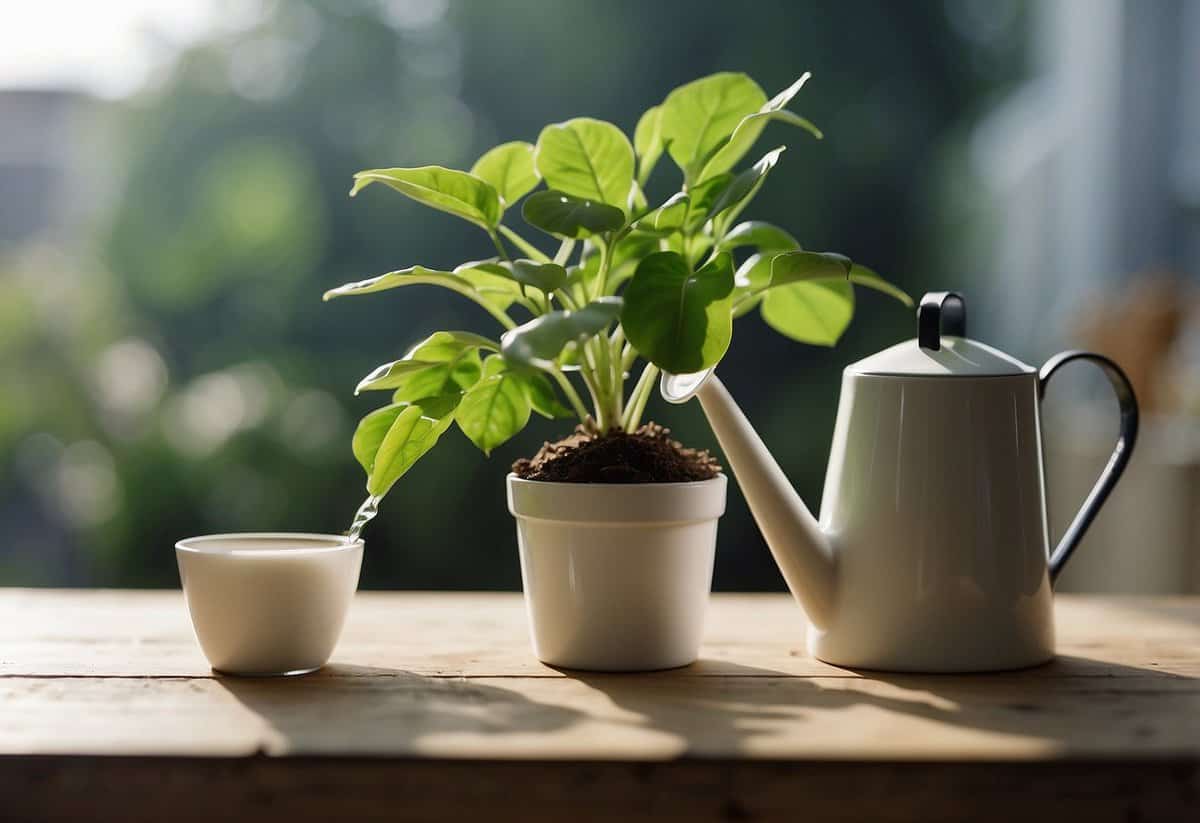
You can mix milk with water in a 50-50 ratio and spray it on plant leaves using a spray bottle. This mix can provide additional nutrients to the plants and even help improve soil health. The beneficial bacteria in milk can break down organic matter, which boosts soil quality and promotes healthy root growth.
Not only can milk nourish your plants, but it can also be used whether it’s fresh, expired, evaporated, or powdered. Before you pour that expired milk down the drain, consider giving your plants a nutrient boost. Try it out and see how your garden thrives with this simple addition!
Understanding Plant Nutrition
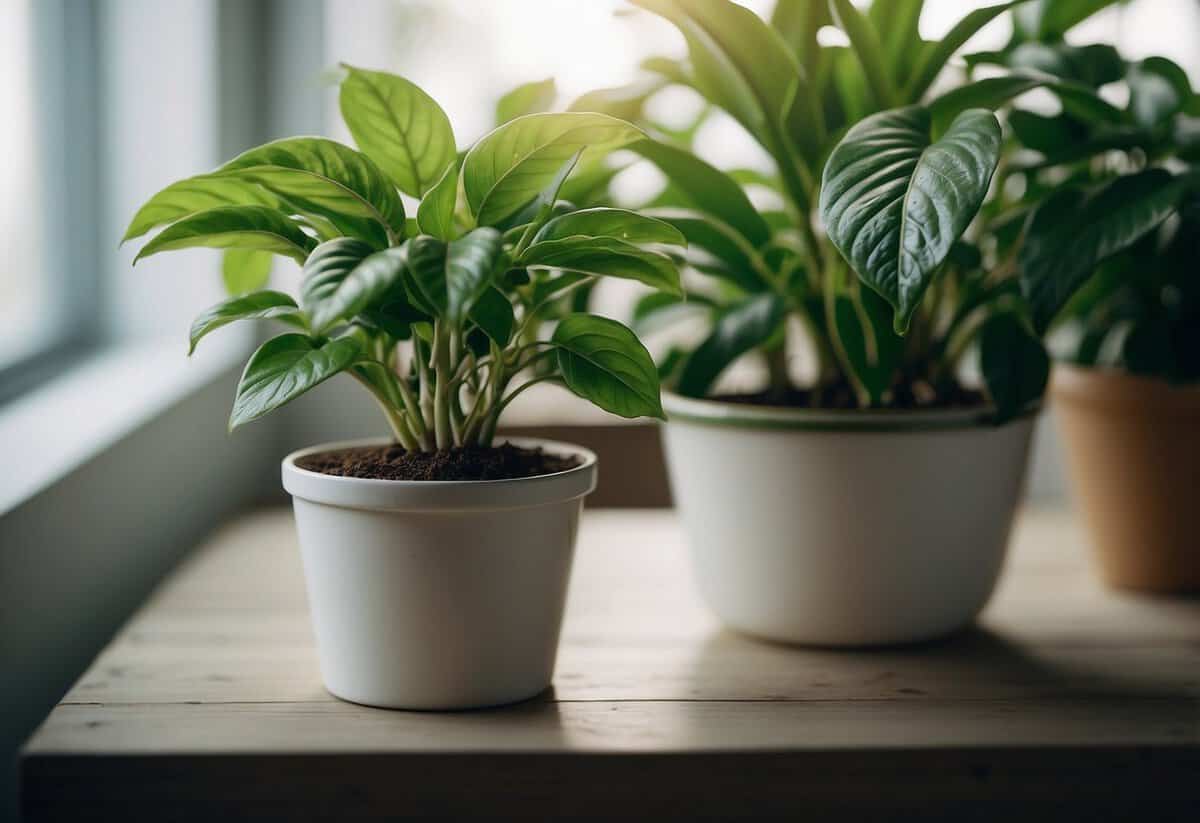
When it comes to plant nutrition, it’s crucial to know what essential nutrients plants need and how different components, such as those found in milk, can support plant growth. Let’s explore these in detail.
Essential Nutrients for Plants
Plants require various nutrients to grow healthily. These nutrients are divided into macronutrients and micronutrients.
- Macronutrients include nitrogen (N), phosphorus (P), and potassium (K). These are often represented as N-P-K ratios on fertilizer packages.
- Micronutrients encompass elements like calcium, magnesium, and iron, which are needed in smaller quantities but are still vital.
Calcium is essential for cell wall structure. A calcium deficiency can lead to poor growth and weakened cell walls. Similarly, potassium helps with water regulation, and phosphorus is crucial for energy transfer within the plant.
Roles of Milk Constituents in Plant Growth
Milk can offer some of these nutrients in an easily accessible form. Diluting milk with water and using it on plants can provide a boost of nutrition.
Proteins in milk break down into amino acids, which can be absorbed by plants and support growth.
Sugars in milk can serve as an energy source for beneficial soil microbes, helping them help your plants.
Calcium, in particular, is plentiful in milk, supporting strong cell walls and overall plant structure.
Using milk can also introduce potassium and magnesium, which aid in various physiological processes, from enzyme activation to photosynthesis.
It’s important not to use spoiled milk, as it can attract pests and cause odors. Instead, use fresh or slightly expired milk that doesn’t smell bad.
By incorporating these constituents correctly, you can take advantage of milk’s potential benefits for your plants. For further guidance, Gardeningetc provides additional advice.
The Benefits of Using Milk on Plants

Using milk in your garden can help your plants thrive. Milk acts as an organic fertilizer, fights pests and diseases, and strengthens plant health.
Milk as Fertilizer
Milk can serve as a good fertilizer. It contains nutrients like proteins, carbohydrates, and calcium. These components can be beneficial for plant growth.
Proteins in milk help your plants build strong cell walls. Carbohydrates give them energy to grow. Calcium aids in the development of plant tissues and root systems.
Using a 50-50 mixture of milk and water, you can water your plants to enjoy these benefits. Apply the mixture every 14 days to avoid over-fertilizing.
Fighting Pests and Diseases with Milk
Milk also works as an antifungal agent. Lactoferrin in milk can fight against fungal diseases. This is important if you have plants plagued by mildew or other fungal issues.
Spraying milk on plant leaves can deter pests like aphids. The mixture can create a barrier on the leaves that pests don’t like.
When using it for pest control, spray the milk solution on the foliage. For optimal effects, do it in the morning or evening when the sun is not too strong.
Strengthening Plant Health
Milk promotes strong, healthy plants. It improves soil quality by boosting beneficial bacteria levels, which help break down organic matter.
Strong root systems are critical for plant health. Milk helps roots grow deeper and stronger, making your plants more resilient.
Watering plants with a milk mixture can also make them more disease-resistant. Healthier plants are better able to fight off diseases, which means fewer issues to worry about in your garden.
Using milk for your plants is a simple, effective way to enhance their growth, health, and resilience.
How to Apply Milk to Your Plants
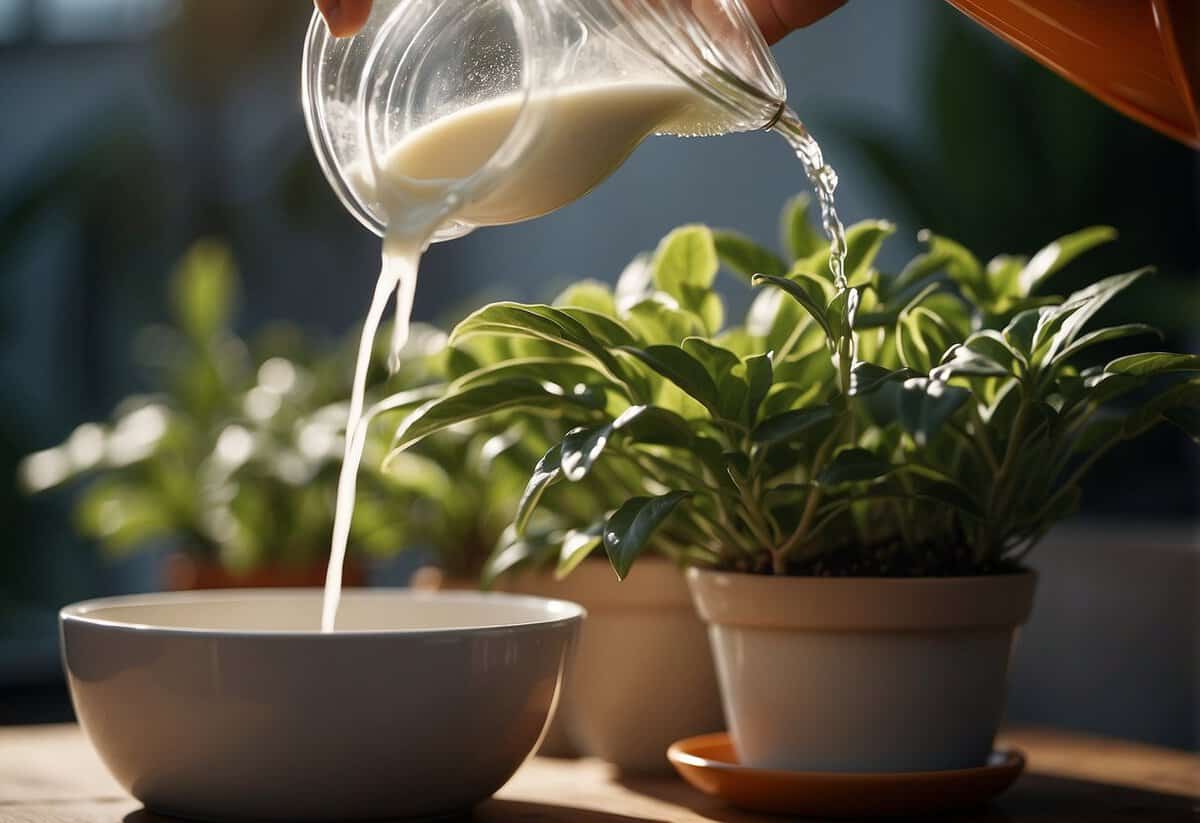
Applying milk to your plants can help with nutrient boost and disease prevention. This section will teach you the best ways to apply milk, ensuring your plants remain healthy without any unpleasant odors.
Direct Watering Versus Foliar Feeding
There are two main methods for applying milk to your plants: direct watering and foliar feeding.
Direct watering involves pouring diluted milk at the plant’s base. This method helps nutrients like calcium reach the roots directly. This is great for preventing issues like blossom end rot. Make sure not to overwater, as this can lead to root rot and other problems.
Foliar feeding means spraying the milk solution on the plant’s leaves. Use a spray bottle for small areas or a garden sprayer for larger gardens. Foliar feeding can prevent powdery mildew due to the milk’s anti-fungal properties.
Diluting Milk for Plant Use
Milk must be diluted before using it on plants to prevent damage. A typical ratio is 50% milk and 50% water. Preparing this solution is simple. Mix equal parts of milk and water in a spray bottle or watering can and shake well.
Dilution is important because undiluted milk can cause unpleasant odors and attract pests. Using buttermilk can also be effective but should be diluted in the same ratio.
Milk that is too strong can harm your plants, so always stick to the recommended dilution ratio. This ensures your plants get the benefits without any downside.
Using Expired Milk
Expired milk shouldn’t be wasted. It can still be useful for your plants as a fertilizer. Instead of throwing it away, recycle it by using it to water your garden.
Expired milk contains proteins, carbohydrates, and calcium that can boost plant growth. Before use, make sure to dilute expired milk in a 50-50 ratio with water. This prevents over-fermentation and foul smells.
Pour the solution near the base of your plants to let the roots absorb the nutrients. Avoid spraying expired milk on the leaves to prevent fungal infections. This practice helps keep your plants healthy and reduces waste.
Special Considerations for Plant Types
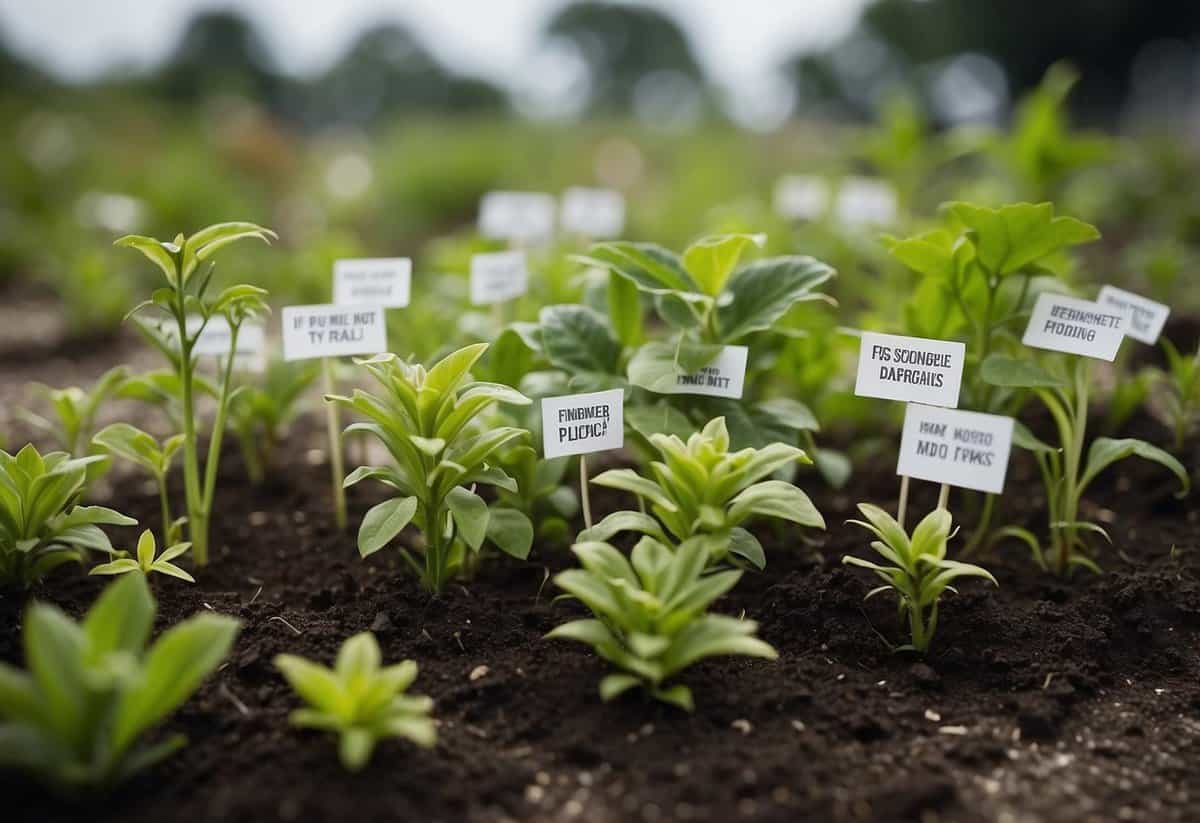
Different plants have unique needs and may react differently to being watered with milk. Here’s what you need to know about garden plants, houseplants, and delicate flowers.
Garden Plants
Many garden plants, such as tomatoes and peppers, can benefit from milk. The calcium in milk helps prevent blossom end rot. Use a 50-50 mix of low-fat or skim milk with water.
Water the base of the plants every couple of weeks. Avoid whole milk or sweetened condensed milk, as the high sugar content can attract pests. Cucumbers and squash can also thrive with this treatment, but be cautious not to overwater.
Houseplants
Houseplants like jade plants and English ivy can get a nutrient boost from milk. A diluted solution of evaporated milk or skim milk mixed with water can be sprayed on the leaves or poured directly into the soil.
This should be done sparingly, about once a month, to avoid mold growth. Angel wing begonias benefit from the protein and B vitamins in milk. Make sure to use fresh milk, as expired milk can cause odors and attract pests.
Delicate Flowers
Delicate flowers like African violets and begonias require special care. Milk can promote growth and prevent diseases, but it should be used carefully. A diluted mixture, using half milk and half water, is best.
Apply this every month, ensuring you don’t drench the flowers. Roses can also benefit from calcium in milk, which strengthens their roots. Be cautious with flavored milk or any additives, as they can be harmful to these sensitive plants.
Using milk on your plants can be beneficial if done correctly. Focus on dilution and frequency to avoid issues like mold and pest attraction.
Avoiding Common Mistakes
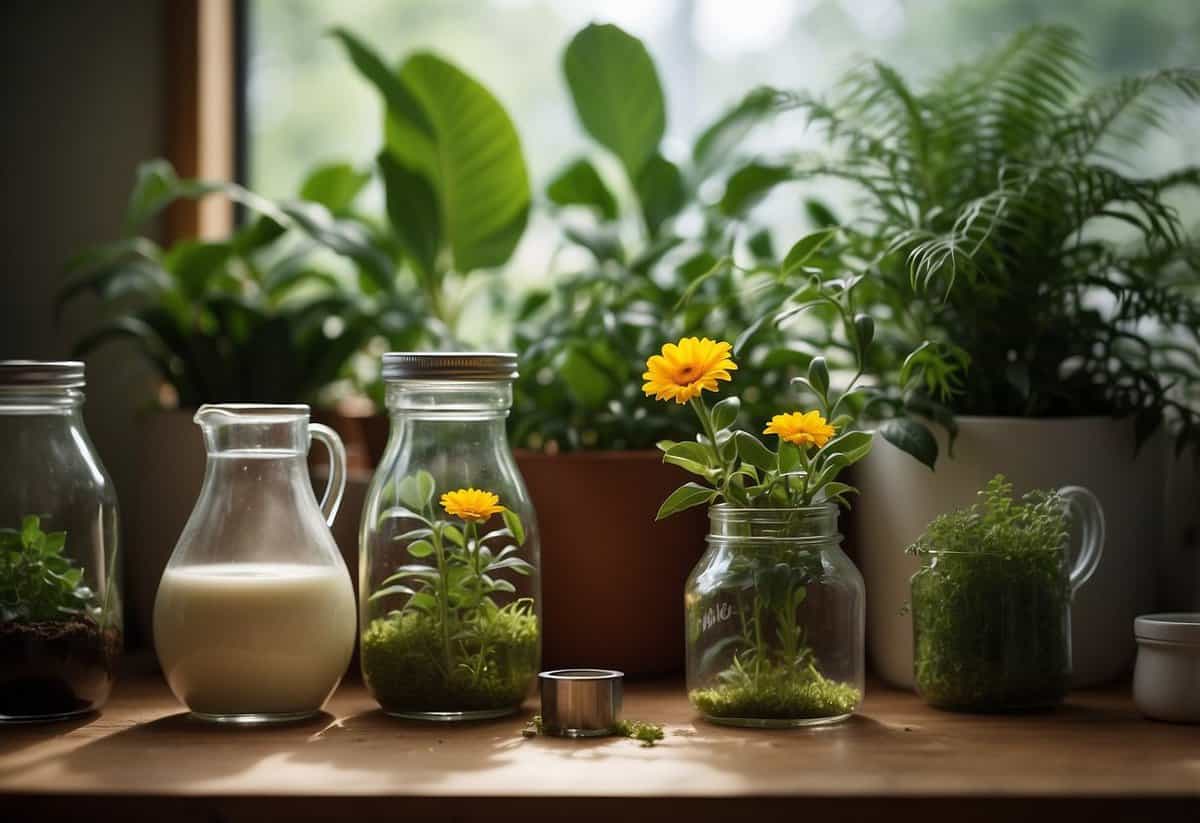
Watering plants with milk can be beneficial, but it requires careful attention to avoid problems. It’s important to use milk in moderation, be aware of potential negative effects, and know when milk should not be used on your plants.
Moderation is Key
Using milk for your plants can be helpful, but overdoing it can cause issues. Dilute the milk with water in a 1:1 ratio to avoid nutrient buildup. Only water your plants with this solution once every 14 days.
Avoid using milk every day. Overuse can lead to mold growth and unpleasant smells. Instead, stick to a routine that provides the benefits without risking your plant’s health.
By carefully measuring and timing your milk applications, you can enjoy the benefits while keeping your plants healthy.
Identifying and Preventing Negative Side Effects
Milk can sometimes cause problems for plants. Be aware of signs like mold, pests, or unpleasant odors. These usually occur when milk is used too often or in the wrong concentration.
To prevent negative side effects, use fresh milk and avoid expired milk. Expired milk can attract pests and create bad smells, especially in hot weather. Also, make sure to wipe down the leaves if milk spills on them, as this can lead to fungal issues.
By monitoring your plants closely and addressing any problems early, you can prevent any harm from milk.
When Not to Use Milk
Milk is not always a good choice for every plant or situation. Avoid using milk on plants that are already healthy and thriving. It’s best used for plants with specific nutrient deficiencies.
Don’t use milk if you live in a very humid area. Milk can spoil quickly in humidity, leading to mold and smell issues. Also, avoid using milk on plants that are sensitive to fungal diseases, as it can make the problem worse.
By recognizing when milk is not suitable, you can make better decisions for your plant’s care.







